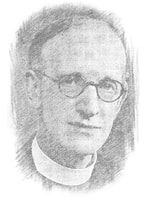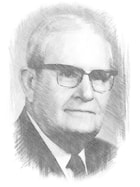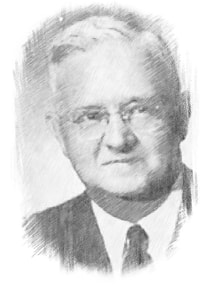John 3

"[N]o doctrine in Christianity is more necessary than the doctrine of rebirth. This is the very ground upon which Christianity stands. A person without this is not to be called a Christian. Just as the article of creation is the first, without which the others would not be (for if man were not created, how could his redemption and sanctification occur?), so if the person is not created anew or born of God, it does not help at all that Christ died for him; nor does it help at all that he has sent the Holy Spirit, and so forth. But when new birth occurs, we enjoy all the more the heavenly Father, our Savior, and the dear Holy Spirit."
--Dale Brown; God’s Glory, Neighbor’s Good: A Brief Introduction to the Life and Writings of August Hermann Francke (Chicago: Covenant, 1982), 135, 142.
--Dale Brown; God’s Glory, Neighbor’s Good: A Brief Introduction to the Life and Writings of August Hermann Francke (Chicago: Covenant, 1982), 135, 142.
 Leslie F Church
Leslie F Church
"What it is that is required: to be born again. We must live a new life. Birth is the beginning of life; to be born again is to begin anew. We must not think to patch up the old building, but begin from the foundation. We must have a new nature, new principles, new affections, new aims. We must be born anothen, which signifies both again, and from above. We must be born anew. Our souls must be fashioned and enlivened anew. We must be born from above. This new birth has its rise from heaven, it is to be born to a divine and heavenly life." (commenting on John 3:3-8)
--Leslie F. Church, ed., Matthew Henry’s Commentary (Grand Rapids: Zondervan, 1960)
--Leslie F. Church, ed., Matthew Henry’s Commentary (Grand Rapids: Zondervan, 1960)
|
John 3:16-18:
For God so loved the world that He gave His only begotten Son, that whoever believes in Him should not perish but have everlasting life. For God did not send His Son into the world to condemn the world, but that the world through Him might be saved. “He who believes in Him is not condemned; but he who does not believe is condemned already, because he has not believed in the name of the only begotten Son of God. |
The answer is love. He loved us so much that He was willing to do the unfathomable, something that made no sense — leave everything to save us. We could not go to God, so God came to us. A true upset. |
Archbishop of Canterbury William Temple, in the 1940s, said that the Church exists “to serve those who are not yet its members,” that is, the whole world.
 Tim Keller
Tim Keller
“The gospel is this: We are more sinful and flawed in ourselves than we ever dared believe, yet at the very same time we are more loved and accepted in Jesus Christ than we ever dared hope.”
― Timothy Keller, The Meaning of Marriage: Facing the Complexities of Commitment with the Wisdom of God
 Herschel H Hobbs
Herschel H Hobbs
Why is it that those who believe in “the Son of man … lifted up” shall have eternal life? “For God so loved the world, that he gave his only begotten Son, that whosoever believeth in him should not perish [ … utterly being lost in hell], but have [ … keep on having] everlasting life” (vs. 16).
Who can enlarge upon this Gospel in a verse? It is called Everybody’s Text.” As indeed it is. Robertson calls it the “Little Gospel.” If the remainder of the Bible were lost and only this verse reserved, it contains enough gospel to save the whole human race! It tells us that God in love takes the initiative in salvation, that He saves through His Son, that this salvation is appropriated through faith in Him, and that those believing are saved to the uttermost of degree and time. And yet, probably fewer sermons are preached from this text than from any other of the more familiar ones. The reason being that when you quote it you have said it all. Explain it one may. But enlarge upon it one cannot. It is the gospel in superlatives.
It tells of the greatest reason for divine love (for), the original source of love (God), the greatest degree of love (so), the greatest emotion of love (loved), the greatest object of love (the world), the greatest relation of love (that), the greatest expression of love (he gave), the greatest gift of love (his only begotten Son), the greatest demand of love (that), the greatest recipients of love (whosoever), the greatest response to love (believeth in him), the greatest deliverance of love (should not perish), the greatest alternative of love (but), the greatest possession of love (have), the greatest quality and extent of love (everlasting), and the greatest fruit of love (life). ---Hobbs, Herschel H., An Exposition Of The Four Gospels: Volume 4, The Gospel of John. Grand Rapids, MI: Baker Book House, page 85-86
Who can enlarge upon this Gospel in a verse? It is called Everybody’s Text.” As indeed it is. Robertson calls it the “Little Gospel.” If the remainder of the Bible were lost and only this verse reserved, it contains enough gospel to save the whole human race! It tells us that God in love takes the initiative in salvation, that He saves through His Son, that this salvation is appropriated through faith in Him, and that those believing are saved to the uttermost of degree and time. And yet, probably fewer sermons are preached from this text than from any other of the more familiar ones. The reason being that when you quote it you have said it all. Explain it one may. But enlarge upon it one cannot. It is the gospel in superlatives.
It tells of the greatest reason for divine love (for), the original source of love (God), the greatest degree of love (so), the greatest emotion of love (loved), the greatest object of love (the world), the greatest relation of love (that), the greatest expression of love (he gave), the greatest gift of love (his only begotten Son), the greatest demand of love (that), the greatest recipients of love (whosoever), the greatest response to love (believeth in him), the greatest deliverance of love (should not perish), the greatest alternative of love (but), the greatest possession of love (have), the greatest quality and extent of love (everlasting), and the greatest fruit of love (life). ---Hobbs, Herschel H., An Exposition Of The Four Gospels: Volume 4, The Gospel of John. Grand Rapids, MI: Baker Book House, page 85-86
 John Calvin
John Calvin
The philosophers postulate four kinds of causes to be observed in the outworking of things. If we look at these, however, we will find that, as far as the establishment of our salvation is concerned, none of them has anything to do with works. For Scripture everywhere proclaims that the efficient cause of our obtaining eternal life is the mercy of the Heavenly Father and his freely given love toward us. Surely the material cause is Christ, with his obedience, through which he acquired righteousness for us. What shall we say is the formal or instrumental cause but faith? And John includes these three in one sentence when he says: “God so loved the world that he gave his only-begotten Son that everyone who believes in him may not perish but have eternal life” [John 3:16]. As for the final cause, the apostle testifies that it consists both in the proof of divine justice and in the praise of God’s goodness, and in the same place he expressly mentions three others.
--John Calvin, Institutes, 3.14.17
--John Calvin, Institutes, 3.14.17

When Jesus came to walk the earth, He was fully aware of its condition. Like walking onto the scene of wreckage after a storm, He felt the despair of what was broken. He didn’t expect things to be right, beautiful or whole. In fact, like a disaster relief expert, His very reason for being here was to fix and redeem the ravaged storm site. The Word of God introduces us to this radical, loving, gracious Jesus who had no expectations, no selfneeds to satisfy, and who imposed no criteria for His involvement other than an invitation. We are told in the book of John that He did not come to judge the world, but to save it (John 3:17). Therefore, He didn’t expect to find people in a righteous state, and most certainly didn’t merely chastise them for their own hearts’ condition. The Jesus of the Bible stooped down, entered the mess, and met people directly at their point of need. For those who received Him, He was able to dissolve brokenness and orchestrate a powerful re-ordering. That’s because wherever His life and power were injected, everything was made new. The price He paid at Calvary bore everything necessary to bring things back to life.








